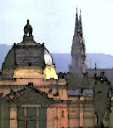The big test?
The big news of the week was the government's decision to open a war crimes investigation into the activities of former General Mirko Norac and his deputy, and the reaction of army veterans and supporters of the opposition to try to force the government to back down. A judge ordered the arrest of Gen Norac on charges relating to his part in an alleged massacre of civilians in the predominantly Croat town of Gospić. About 100 people, sixty of them Serbs and the rest Croats, disappeared from the Gospić region in late 1991. They are thought to be buried in unmarked graves in nearby woodland.
One former soldier, Milan Levar, gave evidence that Gen Norac ordered the killings because he suspected there had been collaboration with rebel Serb forces who were attempting to declare an independent enclave. Milan Levar was himself killed last summer; no one has been apprehended for his murder. Gen Norac denies his involvement in any illegal killings. By press time there was no news of his whereabouts, and no sign that he intended to give himself up.
War veterans on the streeets
The reaction of war veterans and supporters of the party of former President Franjo Tuđman, the Croatian Unity Party (HDZ), was swift and angry. Several important roads in central and southern Croatia were blocked by thousands of demonstrators, who accused the government of treachery and besmirching the reputation of those who fought in the war of independence. The protesters consider Gen Norac as a war hero. The government held back from using massive force to try to move the demonstrators, although Prime Minister Ivica Račan promised that if the roads were not cleared soon, there would have to be much tougher action.
The coalition government, which took power a year ago, has outraged many among the ranks of former soldiers by its willingness to collaborate with the war crimes tribunal in The Hague (ICTY) and by removing from their posts senior army officers suspected of crimes against humanity. Gen Norac was forced to retire last Autumn for making what were called "political statements" about the government's investigations into alleged war crimes.
Gateway to nowhere
Croatian police have been more successful than is customary in the fight against illegal immigration. They intercepted 26 illegal immigrants, including 12 children, who had crossed from Yugoslavia. This group had already been caught once before, in Slunj in central Croatia, and told to leave the country. Instead, they moved north, to Varaždin. They were found this week camped in a field.
In a rather bigger haul, police arrested around 100 illegal immigrants, most of them Chinese, near Zagreb at the weekend. They were hiding in a house near the border with Hungary. It was apparently their intention to travel through that country to the West. Croatia and Slovenia have become major transit points for illegal immigrants brought by gangs of smugglers who charge their "clients" thousands of dollars for uncomfortable and often dangerous passage to the EU.
EU justice ministers have been meeting again this week to try to work out new ways of cracking down on the trade. Yet there are estimated to be 40,000 desperate people waiting in Yugoslavia alone, hoping to find a way to the West. Many have died trying to swim rivers that mark the borders between Bosnia and Croatia.
Hallo, how are you looking after our bridges?
President Stipe Mesić visited Turkey to try to build better commercial links with that large and vigorous country. As well as economic matters, Mr Mesić discussed security issues and EU membership with his counterpart, President Ahmet Necdet Sezer. During some of the worst days of the recent war between Croats and Muslims in Bosnia, the idea of offering any encouragement to Turkey to get involved in the region would have seemed treasonable.
The "Turkish threat"—the idea that Turkey somehow intended to regain its lost Ottoman Empire—was one of the myths used to justify some of the excessive violence of that period. It is a sign of how settled things have begun to appear that the meeting of the two presidents received little coverage in the press. Only Večernji list paid much attention to the promise of a free trade agreement between the two countries.
Yet one more tragedy
As if to underline the importance of stability and reconciliation in the region after those bloody times of the 1990s, Večernji list reported on a tragic story from eastern Croatia. A member of a special unit of the Vukovar police, Damir Stojanović, who took part in the "Flash" and "Storm" operations that drove rebel Serbs out of Croatia in 1995 took his own life this week, at a graveyard near Čuprija.
He killed himself with a home-made pistol, said the paper, between the graves of his father and brother. His brother was killed in 1991 in fighting near Vukovar. Damir was found surrounded by photographs of his dead brother and by his other brother, Željko. He leaves behind him a wife and a three-year-old daughter.
Dan Damon, 11 February 2001
Moving on:
- Browse through the CER eBookstore for electronic books
- Buy English-language books on Croatia through CER
- Return to CER front page
Sources:
Večernji list
BBC Radio
HINA




